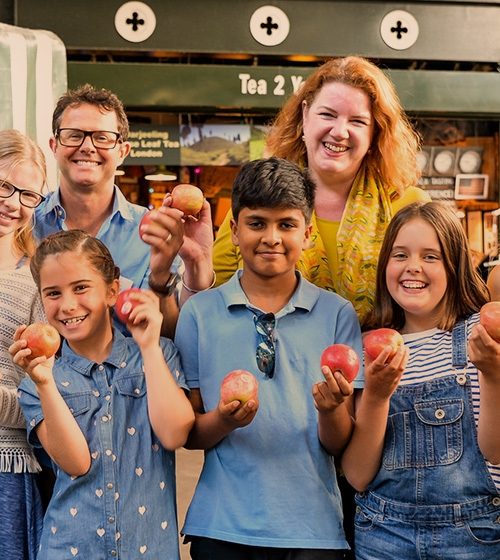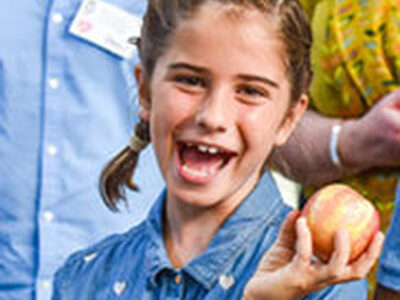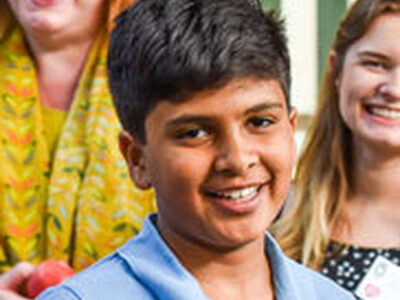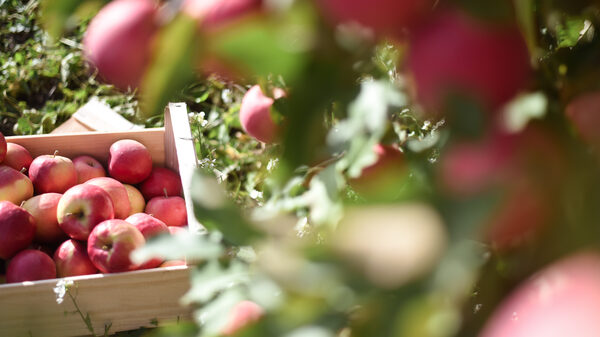
Winners

Check out the 2019 Write It Winners' work, including Ariane from the under 10s category, Noah from the 11-14 age group and Charlotte from the 15-18 category.
You can also read last year’s winning entries from young food writers! We have Monica who won the under 10 category, Sohan from 11-14 category and, finally, Christiane who was the winner of the eldest category, 15-18.
2019
Ariane Boyd
10 and under
The Girl who learnt how to be kind....
There once was a little girl who did not like to share,
She sat away from her friends she just did not care!
She scoffed her sandwiches, raisins, yogurts all to herself,
She munched her pink lady apple well its good for her health!!
Then one day in her bag no lunch to be seen,
Her tummy rumbling she regretted being mean!
Her friends sat together all tucking in,
She realised she had committed a terrible sin.
She was so unhappy her face started to frown,
Her eyes got all wet with tears rolling down.
Her friends gathered round to see what was wrong,
They realised quickly it didn't take them long.
Everyone passed her some of their lunch,
Soon she had plenty to munch!
The feeling she got from her friends being kind,
Is one she will always bare in mind.
So from that day forward she shared as much as she could,
Because sharing food and Happy times with friends made her feel good!!
Noah Eyre
11-14
Pierogi is the food that reminds me most about my Nana. Sadly she died in 2015 when I was 8 years old. When I feel sad or miss her I always think of this special food we shared together.
You see my Nana had cancer; in fact she had it 3 times. Ovarian, breast then into her bones. But, even when she was poorly having chemotherapy or radiotherapy she made pierogi for me and my Mum.
My Nana was Polish. Her parents were born in Poland and came over during the war. Nana was born in one of the Polish camps in Crewe. Food was an important thing that kept the Polish community together. Meals were very simple and humble. The adults and children foraged in the woods for mushrooms, rabbit, potatoes and herbs. Food united families that were separated during the war.
My Nana’s heritage was very important to her. When her ovarian and breast cancer was at its worst she often reminisced about the times on the Polish camp and in particular the potato filled dumplings called pierogi which she would lovingly make for me and my Mum.
Chemotherapy ravished through my Nana’s body often more savagely than the cancer itself. Foods she once loved became intolerable to cook, smell or even eat. My Mum and I would make her soups or pasta dishes in the hope it would build up her immunity and sense of taste again.
However, when Nana was feeling ‘well’ there was nothing better than making pierogi that brought her joy and contentment. I watched and helped how she methodically made these Polish dumplings.
Everything had to be done in a set order and way. The preparation of the ingredients where we all sat round the kitchen table will always be in my memories. We laughed and shared in the experience of making this special food.
Nana would tell me that her own Mum would make pierogi using sauerkraut or corned beef. The version we liked were simply mashed potato and cheese. The little soft dumplings quietly bubbling in the pan of water then sizzling in the frying pan with a little melted butter.
Towards the end of Nana’s life I knew she was slowly slipping away from us. Chemo and radiotherapy weren’t doing their job and we knew things weren’t good. So one afternoon Mum and I made our very own batch of pierogi for her. It was one of those meals that I will never forget. She was thrilled with her pierogi.
Nana died on June 13th, 2015.
Mum and I still make cheese and potato pierogi to this day. We have Nana’s rolling pin and cutters that we still treasure dearly. The simple flour, egg and water dough is made on the wooden board that was hers. We sometimes cheat with ready-made mash but it doesn’t detract from my most favourite food in the whole wide world to share.
Thank you Nana for giving me the love of food and cooking.
Charlotte Corrigan
15-18
For many people in this country, dinner can often comprise a plastic lidded tub, containing something that resembles food, prodded with a fork, 90 seconds in the microwave and voila, there’s your tea. And I’m not disparaging this way of life. To be honest, my mum often resorts to ‘convenience food’ and her mantra that ‘food is simply fuel’ sits uneasily with me.
For my mum preparing a meal is a feat in itself and burning lettuce is something she can achieve with very little effort. Luckily, Granny was different; she was, what my mum calls, ‘a feeder’. She saw love personified through her food. Food was more than fuel, it was an expression of her unquenchable love for her family. Every meal, excuse the pun, was seasoned with love and garnished with a smile warmer than the midday summer sun. Each culinary occasion was treated as a challenge and she would not rest until bellies were filled, waist bands bulged and her diners felt like they needed to be rolled out of the house like Violet Beauregard from ‘Charlie and the Chocolate Factory’.
Food was fun and cooking was a crusade. Granny donned her apron as though she was going into battle. She was in the zone and this wasn’t just routine. Granny worked in the kitchen like John Williams conducting an orchestra. She chopped, stirred and whirled ingredients in a symphony of flavours. Impressively, she always knew the flavours and spices that worked together in harmony. You could say that my Granny had a buxom figure, but whilst in the kitchen she had the grace and dexterity of a ballerina.
I remember the last meal that I ever had the pleasure of enjoying with my Granny. It was late January and the trees looked gnarled and emaciated. The sky was threatening snow and the lights were awakening in the streets. As the car grumbled up to her red brick house, I leaped out, so hungry after a gruelling day of school. Sprinting into the house, leaving my mum to stagger to the door with all of our burgeoning bags, I tore through the house into the kitchen. Smells of roast chicken, parsnips and butter roasted potatoes danced in air.
‘Is it ready Granny?’ I chirped.
‘Not yet my little sugar plum, but here’s a peeled carrot,’ she sing-songed as she handed me a carrot wrapped in a slither of kitchen paper.
Eventually, Granny would showcase her culinary creations. Gasps and hushed whispers filled the air, as she entered the dining room red faced and, always, cheerful. This was an act of love; the coldness of the winter air, contrasted with the warmth of her fat heart. Roast chicken: browned, tender and inviting. Carrots and parsnips: the jewels in the crown and cooked to perfection. Roasted potatoes: crunchy coats and soft fillings. These delights were accompanied by an overflowing dish of stuffing, a huge jug of gravy, peas, Yorkshire puddings the size of my dad’s feet and apple sauce. Yes, I know apple sauce belongs with pork and Yorkshire puddings belongs with beef. But, my Granny’s mission in life was to make me happy.
Motivated by our responses, Granny would pull up a chair and join my mum, dad, Uncle Robin and Grandpa. With eat mouthful of chicken and potato, the troubles of the day melted away. Gradually, our stomachs became fuller, but we all knew that we had to leave room for pudding. This was the moment that we had all been waiting for…. Anticipation grew…. Trifle? Sticky toffee pudding? Apple pie?
Syrup sponge! Golden rivulets descended down the volcano of sponge; molten sugar merged into rivers and tributaries creating an aromatic lake at the base of the mountain. Granny knew that this was my favourite desert: heaven in the form of a pudding.
But as with everything in life, you can’t hold onto the things that you love forever. Food is temporary and so is life. Granny passed away unexpectedly, leaving a huge gulf in my life. But the aromas, tastes and tangs of her meal are etched on my soul forever. She nourished my body and my mind. And I am delighted to say that she has passed the spatula on to me.
Food brings family together. Handshakes, hugs, open doors, open hearts. Rotund and robust, Granny stands there, in my memory, with her arms as wide open as her smile, ready and waiting to give me a huge hug and a mountain of a meal.
2018

Monica Alcover
10 and under winner
Nut the squirrel yawned in his tiny tree house. A fine day was waking up outside, when he heard the Palace soldiers approach his home.
“Good day” chorused the soldiers, “We have post from her Royal Highness.” They gave an envelope to Nut and disappeared into the forest.
It Read:
Dearest Nut,
I have appointed you as the chief snack provider for my coronation tomorrow. Please provide hazelnuts for 300 hungry people.
Yours royally,
Queen-to-be Charlotte
Nut got dressed. He had a busy day ahead of him. He went straight to the forest to seek the hazelnuts.
Meanwhile in the palace attic, a girl called Ella was crying, for she was outstanding at baking, though so poor that she could only be a pot washer to the queens’ Chef Stefano. He was a very cruel and harsh man and never let Ella bake. But with the coronation fast approaching, Stefano gave Ella a job; to make and deliver delicious chocolate icing for the cake.
Coronation day!
Both Ella and Nut were rushing to the Palace to deliver their food. In her haste, Ella tripped over the little squirrel. The icing and hazelnuts flew into the air, landing on Royal Charlotte´s face. The palace went silent. Everybody was waiting for the Queen to be´s reaction. She licked her lips. “It´s simply delicious!” She giggled. Everyone cheered.
She appointed Ella and Nut to become the Royal Chefs and cruel Stefano was fired. They called the incredible chocolatey mixture on Charlotte´s face NUTELLA.

Sohan Desai
11 - 14 winner
Delectable Diwali
A spicy aroma tingled my nose as I walked down the stairs. The smell lured me into the kitchen. Pots and pans filled to the brim with food crackled and hissed like mini fireworks, watched carefully by my grandmother. Ladles scraped against the base of the pots. The pressure cooker whistled like a steam train. Warm air filled the room as if I was basking in the sun. On the kitchen island there was a rainbow of spices in tins matching the rangoli patterns on the doorstep of our house. It was Diwali.
Starters were already laid out. Pistachios hid in their shells like anxious tortoises. Coriander and desiccated coconut clung to the diamond shaped dhokla on the windowsill. Vivid green bowls of chutney were placed beside the dhokla. Crispy piping hot onion bhajees were stacked high.
Our main course was a delicious paneer curry. Making the paneer was like a science experiment. We added lemon juice to boiling milk and watched it curdle to make cheese pieces. It looked like a witch’s cauldron. Now the paneer had magically been turned into a curry and gave off the smell of fiery ginger, which drifted round the room with a vivacious enthusiasm. There was a side dish of spicy potatoes speckled with mustard seeds like little dice. This was to be served together with puris that have puffed up like jellyfish, fluffy white rice and bowls of glistening sunset orange mango pulp.
Of all the scrumptious Diwali foods chocolate barfi is my favourite. To make the chocolate barfi we scrunched up biscuits. They snapped in my hands and crumbled into tiny pieces becoming soft and powdery before we added the chopped nuts. We melted butter in a pan and watched it foam. It gleamed in the rays of sunlight. When I added the cocoa powder it were as if the night sky had engulfed the sun. As we poured the syrup into the nuts the smell reminded nutella. For the topping I melted the luscious chocolate, which oozed in the bowl. I couldn’t stop myself from “testing” it, which warmed my mouth. The luxurious chocolate swirled past my tongue and coated my throat. We built the barfi squares into a tower waiting to be demolished (by me).
Excited chatter and laughter spread through the room. The feasting had begun. The plates of starters were polished clean. My grandmother carefully put out the cauldron of paneer, which was nearly knocked out of her hands by my baby cousin. Hands all reached for food, ladling out the paneer and sharing out the puri leaving our neat work in crumbs. Now for my favourite part, dessert. The barfi crumbled in my hands. I made my way through three squares. My taste buds burst with the extravagant flavours, just as the fireworks started to explode outside.

Christaine Hitchcock
15-18 winner
Determination is a word not often applied to food. Strength, perhaps. Staying power? In terms of slow-releasing carbohydrates, maybe. But determination? That is something unheard of. Perhaps it’s not a concept that should be applied to food itself, but to the people preparing, selling and eating it; to those who can’t afford it; and to those who fight adversity, all for a taste of fame, fortune, or even just the food itself.
A few years ago, food turned into a weapon against me: World War Pea, if you like, or the Wars of the Roses Chocolates. Suddenly, every bite felt toxic. Those around me took to snapping at me for it. “You don’t eat enough.” “Do you hate food or something?” or my personal favourite, “Just eat it.” They couldn’t see that food was not the enemy, but a shield in between me and the black cloud looming on the other side - a civilian, caught up in the conflict between my rational and irrational thoughts.
It was never about the food. It was about the cortisol on standby wiring my mouth shut, the fight-or-flight that turned my stomach, that sick feeling that comes with constant anxiety – something had to give, and somehow food volunteered itself as tribute. No wonder the baby aeroplane trick, employed by a friend trying to force-feed me, didn’t work. What aeroplane wants to land in a warzone? A spoon with any sense would make a sharp about-turn and make an emergency landing back in the bowl. When I told another friend that I couldn’t eat the strawberry she was waving in front of me, we shared a profound moment – the strawberry and I, that is. My friend left the room, declaring that she didn’t want to be associated with someone who wouldn’t eat. I was left sitting on the floor, staring at the strawberry which was red and rough, like my dry tongue. How had they got me so wrong? The same people who had warned me about the calories in my cashew nuts were now pushing me away because as they saw it, I had agreed with them – but I hadn’t. How could I explain to them that I could quite happily leaf through food magazines, practically licking the pages, trying to inhale the calories I so wanted but couldn’t physically eat? That this was more painful for me than it was for them to watch? I not only had to fight with myself, but also with them to get them to believe that I didn’t want this any more than they did - I love food and always have, and this was torture to me.
This is where determination comes into play. While I had the opposite mentality of someone who longed to ignore food, I wanted nothing more than to be able to eat, but every cell in my body squirmed with anxiety when I came close enough to putting anything other than a glucose tablet in my mouth. It was after days of eating nothing but custard creams that I came to my epiphany: I had to force myself. It would be hard, I would feel sick: but I wanted to go back to loving food as much as I always had.
So, I attempted to stir my thoughts together. I read side effects leaflets like recipe books. I dusted my black cloud with flour until it paled then kneaded it in therapy, pummelling every last bit of hot air out of it. I try to knock it back if it rises again. The difference now is that I can feed it with what I want, and not the nothingness it craves: not with the empty energy of Lucozade, but with anything my heart desires. To have to fight an irrational coping mechanism with something you love is never easy, but now I know when to turn down the heat on bubbling thoughts and replace them with a warm cup of tea instead. I can flip through a cookery book again as though it were a self-help guide. More and more, my friends are realising that harsh words will never work on me as well as a hug and a chocolate bar. Determination for me is a cheesy cliché: like a sourdough starter, I had to put more work in before I got any results out. But finally, food and I are back on the same side, and that, for me, is definitely something worth celebrating.
